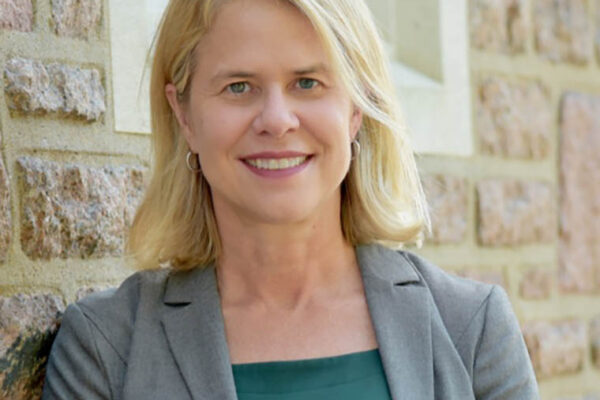Sarah Kendzior has made a career out of connecting the dots.
The journalist, podcaster, author and provocateur, who earned her PhD in anthropology in Arts & Sciences at Washington University in 2012, has written three books, including The View from Flyover Country and Hiding in Plain Sight. She hosts the acclaimed podcast “Gaslit Nation,” with journalist and author Andrea Chalupa. She’s a go-to commentator on current events for news outlets such as NPR, CBS, NBC and BBC Worldwide, among others.
She has been sounding the alarm about election fraud, political corruption and authoritarianism long before it became a regular part of your daily Twitter feed. Although she has seen and written a lot in her relatively young career, she admits she’s still surprised when she discovers a long-forgotten connection to a contemporary news story.
“This happens to me all the time, where I’m reading a book or watching a documentary, and I’ll think to myself, ‘I wonder what happened with this individual,’” she says. “And then I look them up in the archives of a newspaper or find some basic information online and discover a connection to a topic I’m researching, and I’m like, ‘Oh God, not again.’”
It’s what keeps her going, these discoveries and untold stories, such as unraveling the conflicting narratives around the Jeffrey Epstein saga or taking on the myth that the mainstream media began, and continued, to cover a reality-TV star’s presidential aspirations simply because it was good for ratings. These stories and others can be found in her latest work, They Knew: How a Culture of Conspiracy Keeps America Complacent (Flatiron Books, 2022). In the book, she examines why people turn to conspiracy theories at a time when the threats to our country in this century are very real: corruption at the highest level, climate change, gun violence.
“One really easy way to get people to stop looking at corruption is to lump everybody into this big category of deranged conspiracy theorists, and then hope that they shut up about it. But I think we have a right to information. We have a right to accountability.”
Sarah Kendzior
The reason: Because conspiracy theory, confusion and obfuscation work, and in the absence of accountability for our highest-ranking political officials, Kendzior writes, people will grasp on to anything to fill in the information gaps.
“We know that there’s an enormous amount of corruption in this country,” she says. “And that’s not a wild claim. One really easy way to get people to stop looking at corruption is to lump everybody into this big category of deranged conspiracy theorists, and then hope that they shut up about it.
“But I think we have a right to information,” she says. “We have a right to accountability.”
The book, written in Kendzior’s compelling, take-no-prisoners style, explores tactics and names names: “The same cast of characters keep showing up,” she says. And it dives into both known and little-known history, connecting the dots along the way. “There is no moving on without accountability,” she writes. “And there is no accountability without the truth.”
It’s a book she hopes challenges readers to think critically about what they hear in the media, and on both sides of the political spectrum. “I want readers to think independently,” she says. “I want them to fact-check my claims and delve deeper into issues raised in the book, and not accept anything at face value — but also don’t dismiss it at face value, either.”
Kendzior, who makes her home in the St. Louis area, grew up in Connecticut and moved to the Midwest 18 years ago to begin postgraduate studies. She feels as if living here makes her uniquely perched to observe, research and report on the country at-large — for good and for bad.
“It’s good to be in the center of the country in a place that rides the entire political spectrum, as it does here in Missouri,” she says, “You have this incredible demographic diversity, and we’re really the front-runners of all these national issues.” In the past decade, for example, Kendzior has written, podcasted or commented on issues such as the racial politics of poverty in the wake of the killing of Michael Brown in 2014; and the phenomenon of politicians escaping accountability, such as the Missouri governor who resigned in disgrace in 2018 only to resurface four years later in the Republican Senate primary.
“We’re the bellwether state,” Kendzior says, “and now we’re the bellwether state of American decline, unfortunately. The trends that hit elsewhere, they tend to hit St. Louis and hit Missouri before they hit everyone else.
“That’s one of the reasons I tend to discover things before the national media get it,” Kendzior says. “It’s not always because I’ve worked so hard. It’s just that I’m in the right place at, unfortunately, the wrong time.”
The book is sobering, and stays with a reader long after the last page. It’s also, in places, warm and endearing, especially when she writes about being on vacations with her family in oddly historic places, taking hikes in nature to clear her head, and living near the confluence of two great rivers.
“The truth is always worth it,” she writes in the last chapter, “no matter the price you pay.” With all the deeply disturbing subjects she considers in her writings, does she feel cynical or does she ever feel hopeful?
“I definitely wouldn’t describe myself as optimistic. But I’m pragmatic. You have do something to keep you going.”
For Kendzior, that means she’s not going to stop podcasting, researching, writing and looking for more dots to connect. And she remains undaunted. “Maybe this is a St. Louis thing, but I have the mentality of a survivor,” she says. “When you spend all your time living through collapse, and, in my case, studying it, you look for small things to keep you going. Everyday things within your own world, like the love I have for my children, or the love I have of being outside and in our natural environment.
“When things are slipping away, you treasure what’s left, more and more,” she says, “and I think you fight for it harder.”



